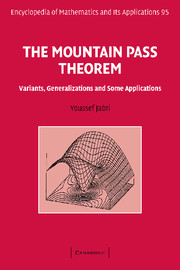Book contents
- Frontmatter
- Contents
- Introduction
- 1 Retrospective
- I First Steps Toward the Mountains
- II Reaching the Mountain Pass Through Easy Climbs
- III A Deeper Insight in Mountains Topology
- IV The Landscape Becoming Less Smooth
- V Speculating about the Mountain Pass Geometry
- 17 The MPT on Convex Domains
- 18 MPT in Order Intervals
- 19 The Linking Principle
- 20 The Intrinsic MPT
- 21 Geometrically Constrained MPT
- VI Technical Climbs
- A Background Material
- Bibliography
- Index
19 - The Linking Principle
Published online by Cambridge University Press: 04 September 2009
- Frontmatter
- Contents
- Introduction
- 1 Retrospective
- I First Steps Toward the Mountains
- II Reaching the Mountain Pass Through Easy Climbs
- III A Deeper Insight in Mountains Topology
- IV The Landscape Becoming Less Smooth
- V Speculating about the Mountain Pass Geometry
- 17 The MPT on Convex Domains
- 18 MPT in Order Intervals
- 19 The Linking Principle
- 20 The Intrinsic MPT
- 21 Geometrically Constrained MPT
- VI Technical Climbs
- A Background Material
- Bibliography
- Index
Summary
Geometry may sometimes appear to take the lead over analysis, but in fact precedes it only as a servant goes before his master to clear the path and light him on the way.
J.J. SylvesterThe notion of linking is very important in critical point theory. It expresses in an elegant way the geometric conditions that appear in all the abstract results seen until now. Various definitions in many contexts (homotopical, homological, local, isotopic, etc.) were given. Some linking notions are presented and their respective forms of linking theorems, containing the MPT, are stated.
After the MPT in 1973, in the late 1970s two new parents came to consolidate the family of minimax theorems in critical point theory. The multidimensional MPT by Rabinowitz [737] in 1978 (Chapter 8 is entirely devoted to this result) and the saddle point theorem (see the additional notes to follow), also by Rabinowitz [738] in 1978. The three results have something in common (we will see soon) and are proved similarly using a stereotyped method. Indeed, as we could see in the chapters devoted to the MPT and the multidimensional MPT, the proof is always done in two steps. This is also true for the case of the saddle point theorem.
- Type
- Chapter
- Information
- The Mountain Pass TheoremVariants, Generalizations and Some Applications, pp. 226 - 239Publisher: Cambridge University PressPrint publication year: 2003



